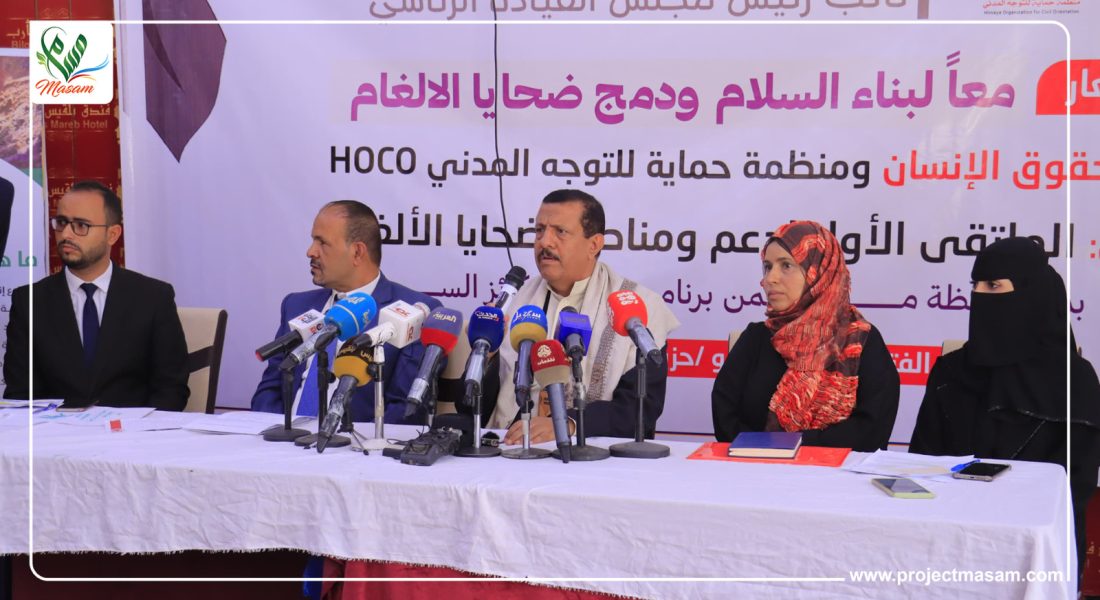The Human Rights Office in Yemen’s Marib region today has held the first forum to support and advocate for landmine victims in partnership with Hemaya Organization for Civil Orientation (HOCO), and sponsored by Project Masam.
Landmines and improvised explosive devices continue to pose life-threatening risks to millions of civilians in a number of mine-affected Yemeni provinces, including the strategic energy-rich region of Marib.
More than 100 participants, including human rights activists and civil society organisations, participated in the event held on 4 June.
The forum aimed to discuss mechanisms for redress for victims at the national and international levels and to enhance accountability, in addition to networking among active actors who support and defend landmine victims’ material and moral rights.
The forum also shed light on the mechanisms that are meant to ensure the integration of mine accident survivors – by referring or linking them to available training and rehabilitation programmes, job opportunities, and projects of local and international organisations, as well as ensuring their right to reparation, their participation in the Yemeni peace talks, and their place in any future political settlements.
In his opening speech, the Undersecretary of Marib Governorate, Dr. Abd Rabbuh Muftah, praised the Project Masam’s humanitarian role in Yemen in relation to the clearance of landmines and explosive devices planted by the Houthi militias, which have killed and injured tens of thousands of civilians, most of them women and children.
He stressed that Project Masam is considered the most critical humanitarian project implemented by King Salman Humanitarian Aid and Relief Center in Yemen, because of its role in saving the lives of Yemenis from landmines and other deadly explosive devices.
The Undersecretary of Marib Governorate criticised the international community’s neglect of governorates and liberated areas under the control of the internationally-recognised government such as Marib as well as their alleged failure to provide any support or assistance to them to help clear mines and protect civilians, while, he claimed, providing millions of dollars in aid to the Houthi militia, assumedly to help the Houthis clear mines in territories under their control.
However, Muftah alleged this aid has been used by the Houthi militia to expand their landmine and explosive devices manufacturing capabilities as well as their landmine planting.
For his part, the Director of the Human Rights Office in Marib Governorate, Abd Rabbuh Jaday’, praised Project Masam for ridding Yemen and the Yemenis of the explosive devices planted by the Houthi militia.
In his address, Jaday’ pointed out that Project Masam’s extensive efforts alone are not enough to rid Yemen of the landmine threat, calling for a serious international community push to force the Houthi militia to put an end to their landmine manufacture and planting, and to hand over any maps or geographical coordinates pertaining to the location of minefields.
The director claimed that by indiscriminately and extensively planting landmines, the Houthis’ goal is to punish those opposing to their rule and to cause the largest possible number of victims.
During the sessions of the first day of the forum, the audience heard testimonies of landmine victims and survivors – some of whose limbs were amputated or were permanently disabled.
On 3 June, Project Masam announced that its demining teams removed 1,406 landmines, unexploded ordnance (UXO), and improvised explosive devices (IEDs) during the last week of May, bringing the total removed during the month of May to 5,726.
According to a Project Masam statement, the project’s demining teams have so far cleared 56,881,560 square meters of Yemeni land that was booby-trapped with landmines, and explosive devices, and left littered with unexploded ordnance.

